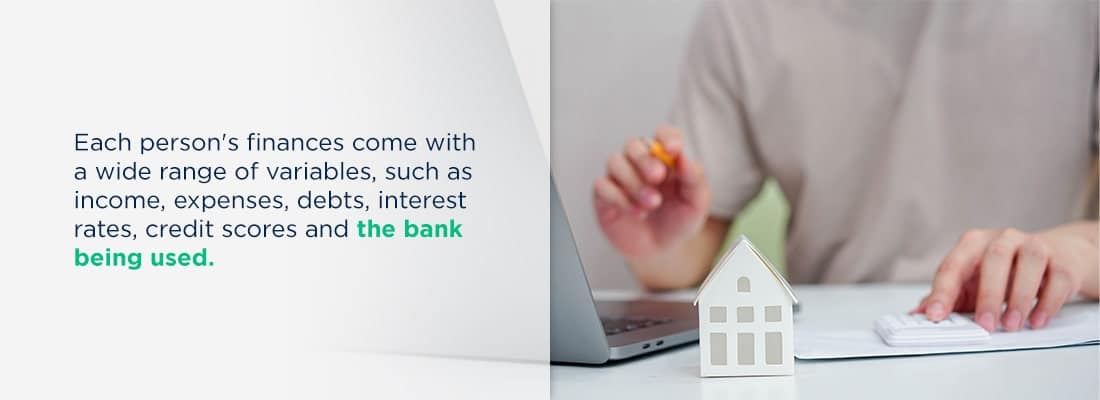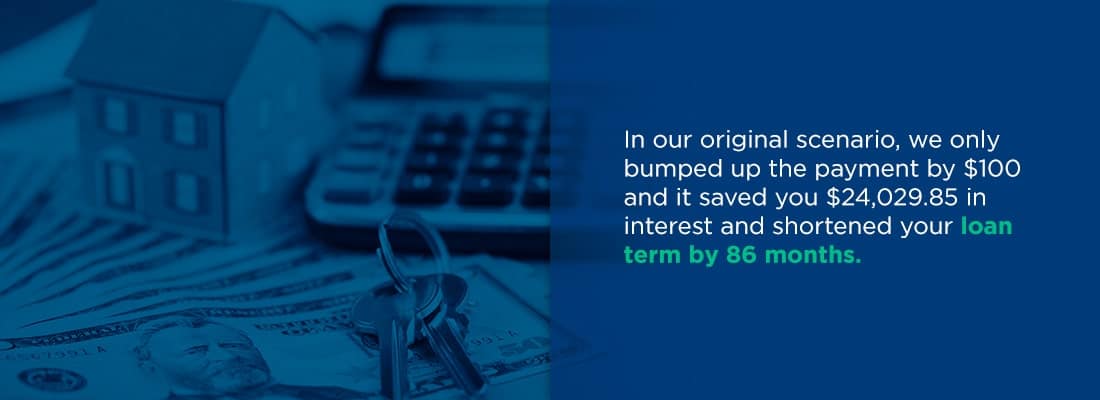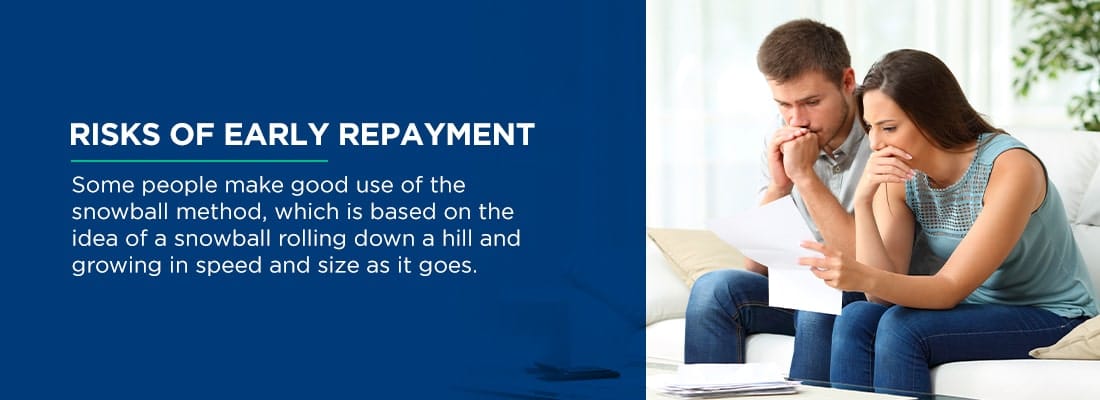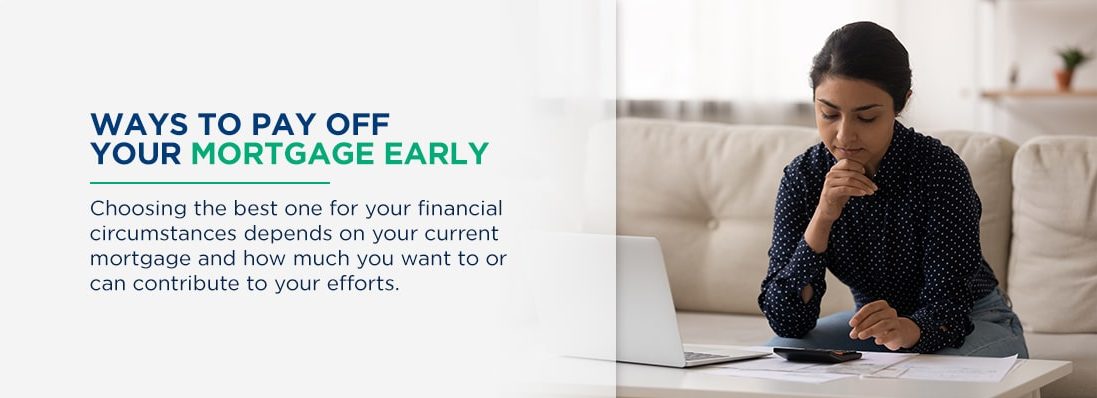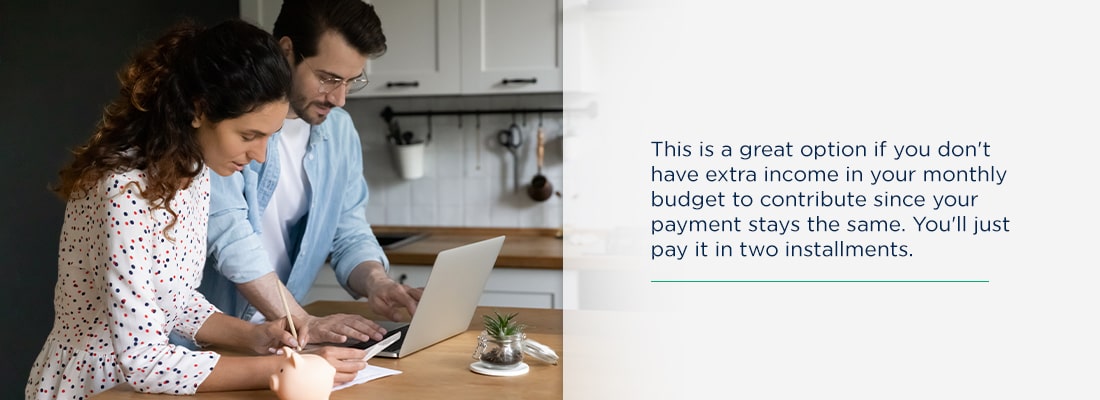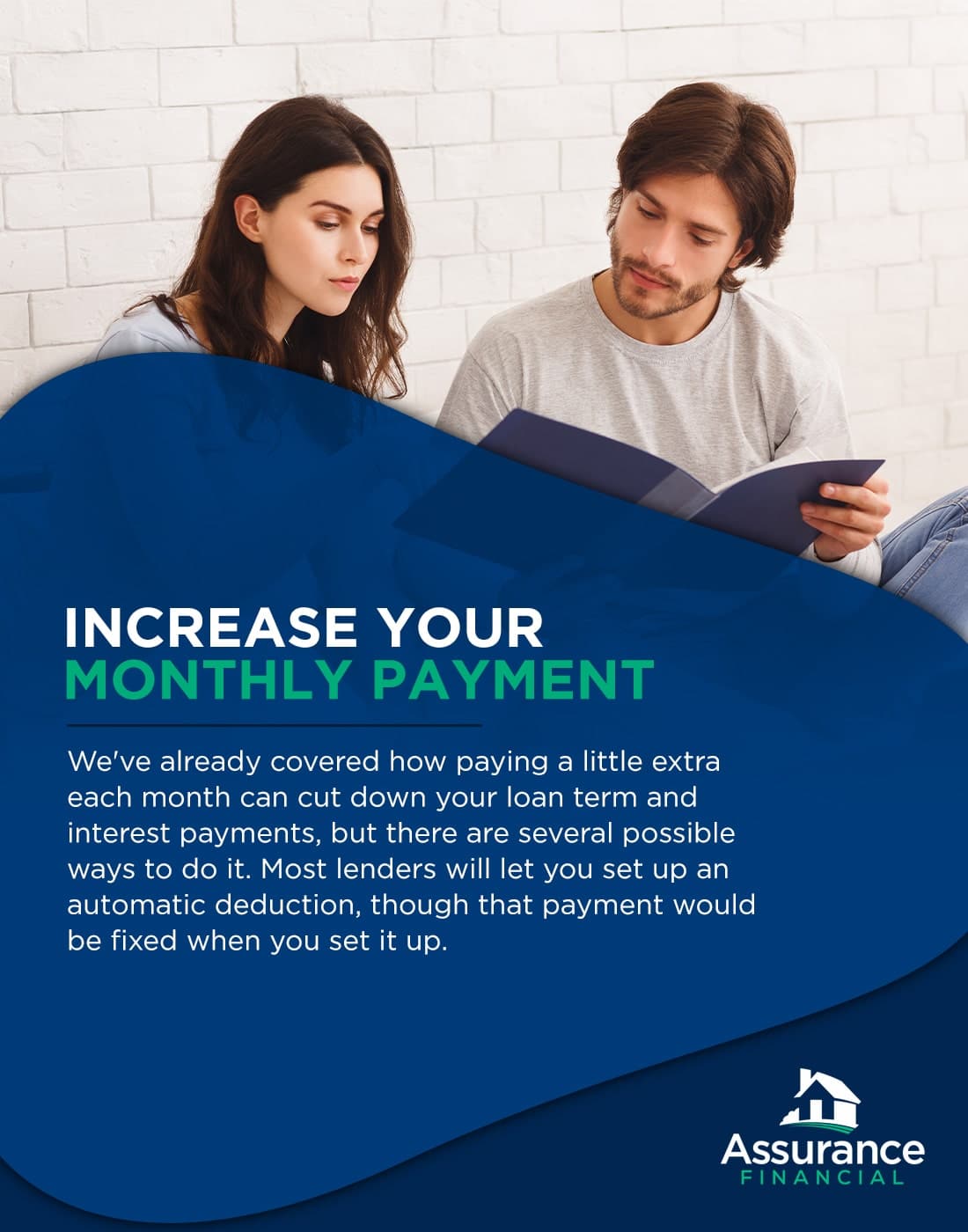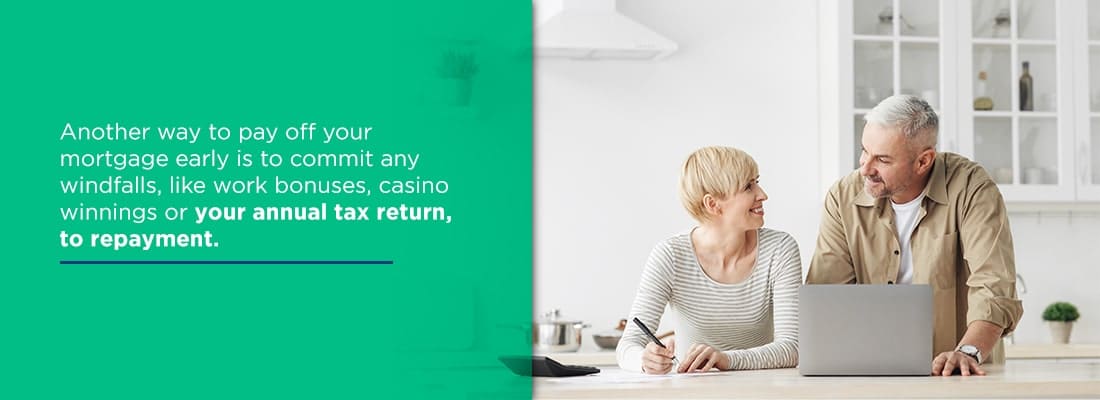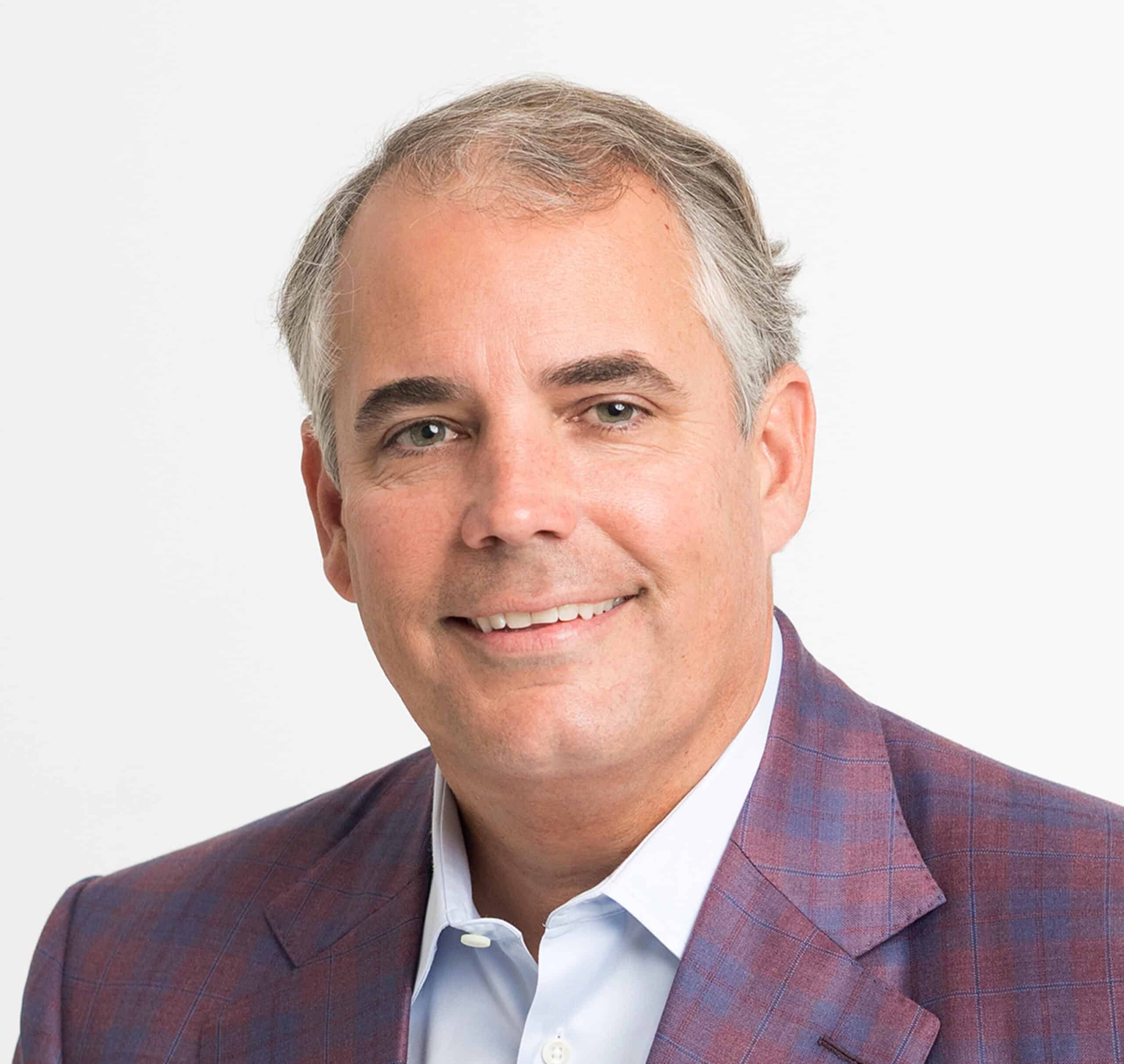Owning a home may be the American dream, but paying off your mortgage early seems more like a far-fetched fantasy. We have good news. It isn’t, and paying off your mortgage early could help you save thousands of dollars in interest, get rid of big monthly payments, and live lien-free! By understanding the process and having the proper plan, it’s even possible for young homeowners to pay off their mortgage by 30.
Regardless of your age, there are ways to turn your paid-off mortgage fantasy into a reality. We’re going to break down the steps, answer some of your most pressing questions and help you take the next step toward your financial freedom!
To understand how paying off your mortgage early works, let’s look at how your current payments are set up. When you pay your monthly bill, that money is split two ways. One-half goes to the principal, which is also known as the mortgage balance. The other half goes toward paying the interest, which is the percentage your bank is charging for them to loan you the money.
When you’re trying to pay off your mortgage early, you can contribute additional funds to the principal balance, which then reduces how much you owe and shortens the timeline of repayment, resulting in fewer interest payments.
Let’s say you’re buying a home and you take out a 30-year fixed mortgage for $125,000 with a 4 percent interest rate. Your payment would be around $596.77 a month, but over the life of the loan, you’d end up paying close to $89,836.59 in interest. That’s on top of the amount you originally borrowed, turning a $125,000 loan into a $214,836.59 one.
Now let’s say you decided to pay an extra $100 a month on this same mortgage, interest and term length. Now, instead of paying $89,836.59 in interest by the end of the loan, you would have to pay $65,806.74. That small monthly boost saves you $24,029.85! It also shortens your loan term by 86 months and leaves you with a new total of $190,806.74. So, with just an extra $100 a month, you save 27 percent in interest and pay it off 24 percent faster.
This is only one example of early mortgage repayment, so we’re going to explore other methods and scenarios that may work better for you. But before we break down how you can do it, it’s valuable to ask yourself if you should do it. Not all experts think that paying off your mortgage early is as sweet a deal as it sounds. Keep reading to find out why.
Should You Pay Off Your Mortgage Early?
Just because you can do something, doesn’t mean you should, and the same goes for where to put your extra cash. Some people might ask, “Isn’t getting out of debt a good thing?” but they’re asking the wrong question. It can be a good goal for some and the wrong goal for others, and knowing the difference requires case-by-case examination.
Each person’s finances come with a wide range of variables, such as income, expenses, debts, interest rates, credit scores, and the bank being used. Taking financial recommendations and holding them up to the light of your own circumstances is an important part of planning your financial goals.
Sometimes the perks of paying off your mortgage early don’t outweigh the opportunity of putting your cash to work somewhere else. So, without any clear “should you” or “shouldn’t you,” let’s investigate the benefits and the risks of early mortgage repayment and how they may apply to your finances.
Benefits of Early Repayment
The first benefit of paying your mortgage off early is that it can save you money in interest fees. As we’ve demonstrated, paying more each month or refinancing for a shorter term with a better rate could save you thousands of dollars! Those are some significant savings. The best part is, it doesn’t take much to see those kinds of positive results.
In our original scenario, we only bumped up the payment by $100 and it saved you $24,029.85 in interest and shortened your loan term by 86 months. Imagine if you doubled that? At $200 extra a month, you’re looking at $52,117.49 in interest savings and paying off your loan 137 months sooner. That’s 11 years and 5 months saved. Can’t swing the $100? Cut that in half and you’re still saving $13, 978.59 and saving yourself 4 years of payments. A little goes a long way!
Paying off your mortgage sooner also frees up money in your monthly budget later in life. With your mortgage bill gone, you could contribute that monthly amount to any number of things, such as other debt, your 401k, Roth IRA, HSA, your emergency fund, or other investment opportunities. It could allow you to spend your later years doing the things you’ve always wanted to do, like travel or take up an interesting hobby. Dreaming of ways to spend that monthly payment can be a real motivator to pay off your house early!
Some people weigh the value of early repayment against missed investment opportunities. While stocks typically have a greater return, they’re not always reliable. The market can be volatile, but your mortgage payment is showing up no matter what the market’s doing. So if you have $100,000 in investments and the market takes a turn, your portfolio could take a devastating hit. Unfortunately, your lender isn’t going to adjust your bill accordingly. Mortgages have fixed liability, so no matter what happens to you, your loan is still gonna be due.
Few people regret getting out of debt. You could gain even more by putting your extra money elsewhere, you probably won’t wish that you still had a mortgage when it’s finally gone. When considering repayment, numbers play an important role in our deliberation, but we can’t ignore the emotional and psychological impact of financial decision-making. Since the stock market isn’t guaranteed to give you predictable returns, the psychological benefit of owning your home free and clear cannot be easily dismissed!
Risks of Early Repayment
While there are plenty of benefits to early repayment, there is a fair share of risks as well. Your mortgage may not be the best loan to pay off first. You should prioritize other high-interest debts, like credit cards and student loans before your home. Your interest savings on your mortgage will pale in comparison to what you could save if you paid off your other debts first.
Some people make good use of the snowball method, which is based on the idea of a snowball rolling down a hill and growing in speed and size as it goes. Financially, this looks like paying extra on the debt with the highest interest rate and working down the list until you’re paying off the lowest interest rate.
So let’s say you have a credit card with a $5,000 balance and a 16 percent interest rate, a student loan balance of $7,500 with a 7 percent interest rate and your $125,000 mortgage at a 4 percent interest rate. Following the snowball method would look like paying the credit card first, followed by the student loan, and then the mortgage. This way, you’re saving the most on interest payments.
But before you even start the snowball method, you should be sure to have a healthy emergency or rainy day fund for any unforeseen expenses. Without one, you may end up accruing more high-interest debt in order to cover these events, which would counteract all the work you put into paying off your original loans.
Another risk of early mortgage repayment is missing out on other investment opportunities with higher returns. While the stock market isn’t guaranteed, there is a historical basis of an average return dating back as far as 1928. While not all stocks are fool-proof, some are safer than others and can yield a return that outweighs what you would’ve saved in interest payments.
The same could be said for retirement accounts or other savings methods that use compounding interest. The sooner you save, the more money they can accrue. So if your interest rate is 4 percent but your portfolio returns an average of 7 percent, you’ll lose money by paying your mortgage off faster.
Paying off your mortgage early can also tie up the majority of your net worth in a non-liquid asset. There’s a difference between having $125,000 invested in a home and having $125,000 in cash. Smart investors try to have a balance between liquid and non-liquid assets, so if paying off your home is going to skew that balance, you may want to consider evening things out instead of wrapping up all your wealth into a house.
Imagine if you had a life event that cost you more than your emergency fund. Getting cash to cover things like losing your job, medical treatment for a serious illness or even something like starting your own business would mean you would either have to borrow against your house, which practically defeats repaying it early, or selling it, something that may not be a reasonable option if that house is the one you live in!
You also need to consider the fact that paying off your mortgage early is a long-game investment. If you, like most homeowners, have a fixed rate, then your monthly payment is staying the same until the loan is paid in full, which means you won’t see the fruits of your labors until the term is up.
If you end up quitting on paying extra, you could end up with dead equity, or money tied up in an investment that isn’t making you anything. Unless you see your early repayment through to the end, you could be wasting the money you’re using to pay off your mortgage by not investing it in something with higher returns.
Lastly, paying off your mortgage early requires sacrifices, which brings us back to the emotional and psychological aspects of this decision. It can take years to see the benefits of early repayment. Mortgages are for the long haul, and even if you cut a 30-year term in half, that’s still 15 years before you’re using that disposable income in a discretionary way.
Is Early Repayment Right for You?
You should base your financial decisions on your individual circumstances, but we can help frame some scenarios that can help you quickly decide if early repayment works for you. We’ve created two qualifications lists to review that may help you figure out if paying extra on your mortgage is a good idea.
Here are some reasons to forgo extra payments on your mortgage:
- You have other high-interest debts
- You don’t have an emergency fund
- You aren’t on track for retirement
- You’ll benefit from using your mortgage interest as a tax deduction
Conversely, here are the scenarios where paying off your mortgage early could be beneficial:
- Your high-interest debts are paid, you have an adequate emergency fund, and you’re paying into retirement
- You have a healthy balance between liquid and non-liquid assets
- You already have a healthy stock portfolio
- You have the opportunity to refinance to a lower interest rate
- Your monthly income increased
Neither of these lists covers the full scope of every possible scenario, but if your situation identifies overwhelmingly with either of these lists, then you probably have your answer on whether you should pursue paying off your mortgage early.
Ways to Pay Off Your Mortgage Early
If you’ve done your homework, reviewed your finances, and decided that paying off your mortgage is right for you, then we want to teach you some ways to make that dream a reality. There are a few different strategies for paying off your mortgage early. Choosing the best one for your financial circumstances depends on your current mortgage and how much you want to or can contribute to your efforts.
Switch to a Biweekly Payment Schedule
The first option is to switch to a biweekly payment schedule. This is a great option if you don’t have extra income in your monthly budget to contribute since your payment stays the same. You’ll just pay it in two installments. So if your payment is $596.77, as in our mortgage example from earlier, you’ll pay $298.39 one week and then another $298.39 two weeks later.
The reason this can help you pay off your house early is that it uses the weeks of the year to your advantage. When you’re on a once-a-month schedule, you end up paying 12 times on your loan. But, on a biweekly schedule, you pay 26 times a year, which affords you one extra annual payment. That means an extra $596.77 a year, which would be the equivalent of an extra $49.73 a month, and we already covered what an extra $50 months could mean for interest savings!
Increase Your Monthly Payment
We’ve already covered how paying a little extra each month can cut down your loan term and interest payments, but there are several possible ways to do it. Most lenders will let you set up an automatic deduction, though that payment would be fixed when you set it up. You could also manually pay extra each month, which may be less convenient but it allowing you flexibility in your contributions.
Several methods can help you decide how much extra you want to contribute month-to-month. It could be as simple as an arbitrary number or rounding up your monthly payment, which would look like bumping up your $596.77 payment to $600. You could also take a non-essential budget item, like a subscription service or your daily cup of artisan coffee, and spend that money on your principal instead.
Another method you could try is the dollar-a-month method. This is where you add one extra dollar a month for the life of the loan. So in the first month, you’d pay just one dollar more. But by month 86, you pay $86 dollars more.
No matter how you decide to do it, consider choosing the option that you’re most likely to stick with or can afford to see through to the end. Remember, you don’t want to risk any dead equity.
Commit Bonuses and Tax Returns to Your Loan
Another way to pay off your mortgage early is to commit any windfalls, like work bonuses, casino winnings, or your annual tax return, to repayment. So instead of adding extra to your payment per month, you’d be contributing a lump sum whenever they come in. So let’s say you get a $1,200 tax return in June and a $1,500 Christmas bonus in December. You’d simply take those checks and pay them on your principal.
This strategy doesn’t cut into your monthly budget but considers whether you have the discipline to spend your bonuses on your mortgage. Be sure to also check whether your loan has a prepayment penalty before using this strategy!
Refinance to a Shorter Loan
It’s common for home-buyers to opt for a long-term loan in order to reduce their monthly payments, but over time your financial circumstances may change for the better and you could use your increased cash flow for extra payments on your mortgage.
Refinancing is a great way to put that new or freed up cash to good use. By refinancing for a shorter loan term, your monthly payments will go up but your timeline and interest will go down. If you also qualify for a better interest rate, that could increase your savings even further!
So let’s say you have a balance of $112,839.43 on your $125,000, 30-year fixed loan with 4 percent interest and 25 years left on the life of the loan. In those five years, you’ve increased your monthly cash flow and you find out that you qualify for a better interest rate. By refinancing your house to a 15-year fixed loan with a 3 percent rate, your monthly payment of $597 goes up by $197 but you will save $39,154 in interest.
One thing we left out of our calculations is the closing costs, which can total from two to three percent of the loan. Depending on your situation, that extra percentage could offset any money you would save on interest. Even so, there are other good reasons to consider refinancing, such as consolidating debt, taking out cash on your home, or paying off private mortgage insurance.
If you’re considering refinancing, check with a lender to find out what you’re eligible for, and then use a reliable refinance calculator to crunch the numbers to see whether refinancing could help you pay off your mortgage early and save you money!
[download_section]
Refinance Your Mortgage with Assurance Financial
Of the ways to pay off your mortgage early, refinancing is the one that requires the right financial partner. But we don’t want you to settle for a loan officer who’s in it for the commission. Choose Assurance Financial instead. With over 20 years of lending experience and a 4.8-star customer rating taken from thousands of reviews, we are the partner you deserve.
In addition to our stellar customer service, we have the latest in application technology to make starting your loan simple and fast. With our end-to-end processing, as well as Fannie Mae, Freddie Mac and Ginnie Mae service approval, we do not need to outsource your loan details. We keep it all under one roof, which keeps your information safe and in one place.
Let Assurance Financial help you get a loan that fits your needs. To start your application online, apply with Abby or get in touch with one of our experts. We can’t wait to help you take the next step!
Linked Sources:
- http://pages.stern.nyu.edu/~adamodar/New_Home_Page/datafile/histretSP.html
- https://www.ramseysolutions.com/debt/how-the-debt-snowball-method-works
- https://www.forbes.com/advisor/mortgages/principal-interest/
- https://www.consumerfinance.gov/ask-cfpb/what-is-the-difference-between-a-fixed-rate-and-adjustable-rate-mortgage-arm-loan-en-100/


